The Best 10 Alternatives to Symantec (+ Pricing & Reviews)
Twingate Team
•
Jul 27, 2024

Symantec Enterprise Cloud offers comprehensive cybersecurity solutions for large enterprises, focusing on data-centric hybrid security. Their services include consistent compliance, secure remote work, and data and threat protection. However, Symantec might not be the choice for everyone. This article explores the benefits and limitations of Symantec's offerings.
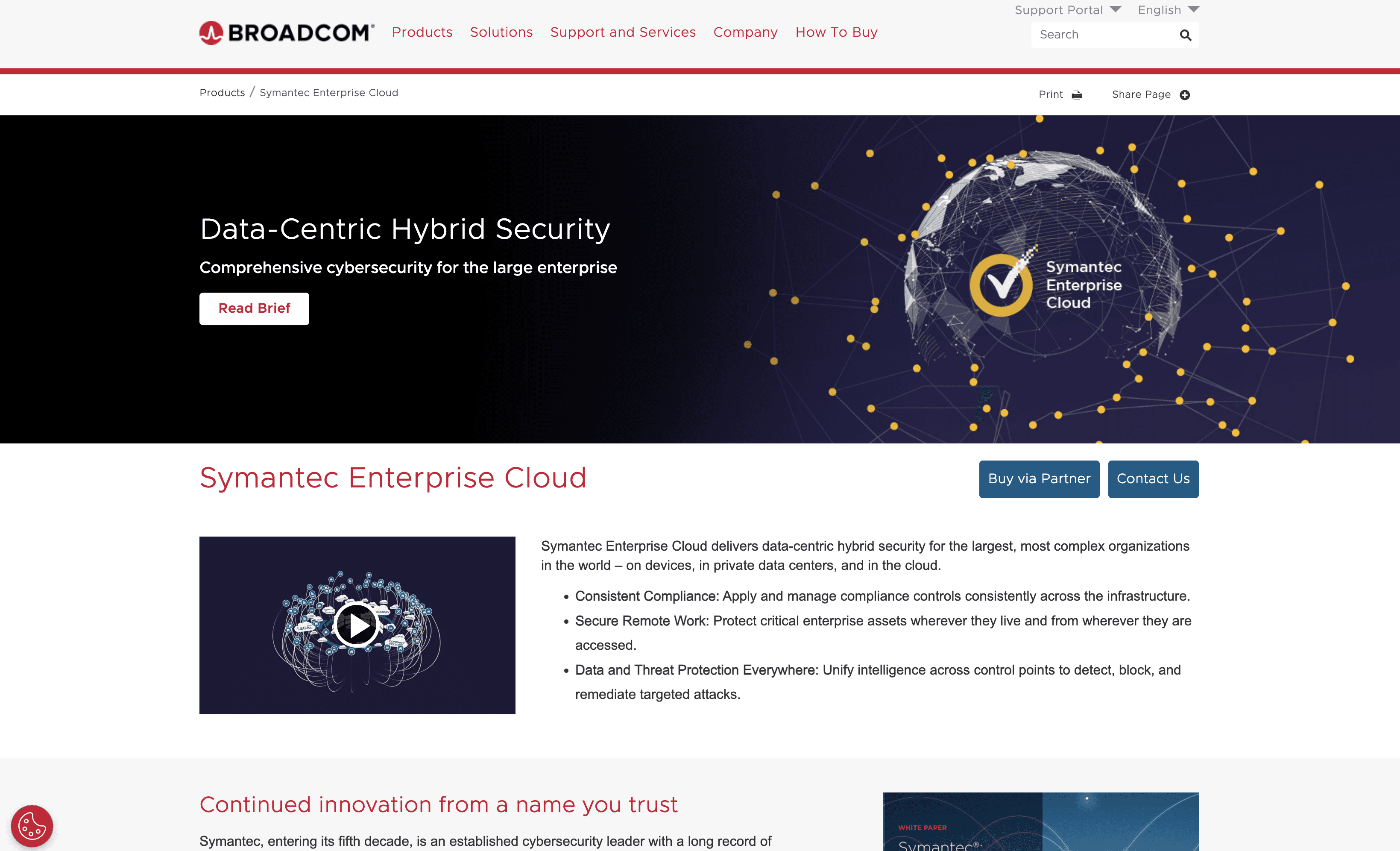
10 Alternatives to Symantec
1. Threatlocker
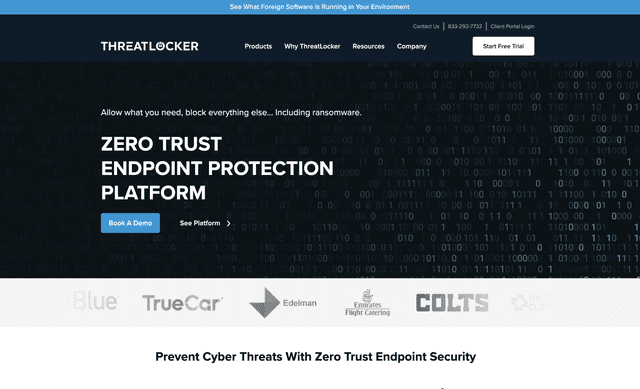
ThreatLocker is a cybersecurity solution designed to provide enterprise-level protection through Zero Trust endpoint security. It offers features like allowlisting, network control, and storage control, aiming to block untrusted software and prevent cyber threats. ThreatLocker focuses on ease of use and robust security for businesses of all sizes.
Threatlocker Pricing
Threatlocker's pricing is not public. Contact their support for more info.
Threatlocker Reviews
ThreatLocker has an overall rating of 4.8 out of 5 stars based on 162 reviews. Users praise its excellent product quality and unmatched support. Check out more of our reviews here!
Pros and Cons of Threatlocker
Pros:
ThreatLocker provides a robust Zero Trust security model, allowing only necessary software to run and blocking everything else, including ransomware.
The platform includes various tools such as Allowlisting, Ringfencing™, Network Control, and Storage Control, offering a wide range of security features.
The Cyber Hero Team provides 24/7/365 support, ensuring quick response times and expert assistance.
Cons:
The comprehensive nature of the platform might be overwhelming for smaller organizations or those without dedicated IT security teams.
Transitioning to a Zero Trust model and setting up all the features might require significant time and effort.
The advanced features and 24/7 support might come at a higher cost, which could be a barrier for smaller businesses.
2. Cisco Secure Endpoint
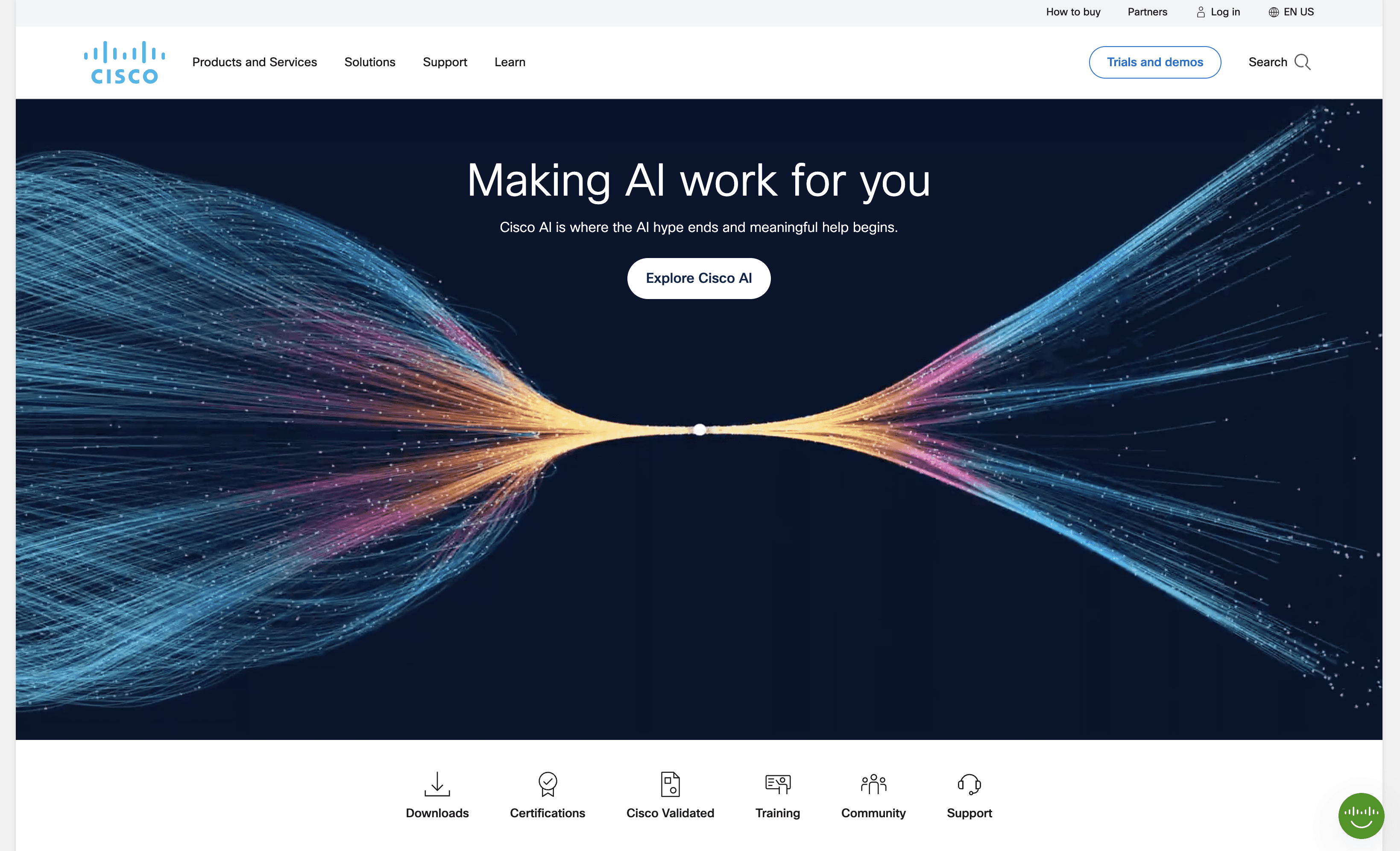
Cisco Secure Endpoint is a cloud-native solution designed to provide advanced endpoint security. It focuses on quick detection, response, and recovery from attacks, aiming to reduce remediation times significantly. With features like threat hunting and integrated risk management, it offers a comprehensive security approach for businesses.
Cisco Secure Endpoint Pricing
Cisco Secure Endpoint's pricing is not public. Contact their support for more info.
Cisco Secure Endpoint Reviews
Cisco Secure Endpoint has an overall rating of 4.5 out of 5 stars based on 21 reviews. Users praise its ease of use and comprehensive protection. Check out more of our reviews here!
Pros and Cons ofCisco Secure Endpoint
Pros:
Powerful EDR Capabilities: Advanced endpoint detection and response, threat hunting, and risk-based vulnerability management.
Streamlined Investigations: Orbital Advanced Search provides quick answers about endpoints, simplifying investigations.
Integrated XDR Capabilities: Unified view and automated playbooks with SecureX platform for simplified incident management.
Cons:
Compatibility Issues: Some users report problems with compatibility across different systems.
False Positives: Occasional inaccurate threat detection can lead to unnecessary alerts.
Usability Concerns: Certain areas of the platform are not user-friendly, affecting overall experience.
3. Kaspersky Endpoint Security Cloud
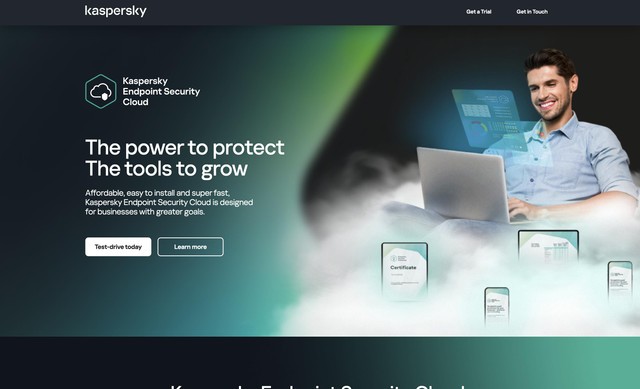
Kaspersky Endpoint Security Cloud is a cybersecurity solution tailored for small to medium-sized businesses. It offers comprehensive protection against malware, ransomware, and other cyber threats. With easy installation and management through a web browser, it ensures robust security while being user-friendly and efficient.
Kaspersky Endpoint Security Cloud Pricing
Kaspersky Endpoint Security Cloud's pricing is not public. Contact their support for more info.
Kaspersky Endpoint Security Cloud Reviews
Kaspersky Endpoint Security Cloud has an overall rating of 4.3 out of 5 stars based on 217 reviews. Users appreciate its single console management and effective protection against various cyber threats. Check out more of our reviews here!
Pros and Cons of Kaspersky Endpoint Security Cloud
Pros:
Comprehensive Protection: Offers robust defense against malware, ransomware, and other cyber threats, ensuring business continuity.
Ease of Use: User-friendly cloud management console simplifies security administration, even for non-experts.
Cost-Effective: Affordable solution with no need for additional hardware, making it ideal for small to medium-sized businesses.
Cons:
High Resource Usage: Some users report that the software can be resource-intensive, potentially slowing down devices.
Compatibility Issues: Occasional problems with compatibility across different systems can disrupt operations.
Complex Console Management: The management console may be challenging for users unfamiliar with cybersecurity solutions.
4. Eset Endpoint Protection Advanced
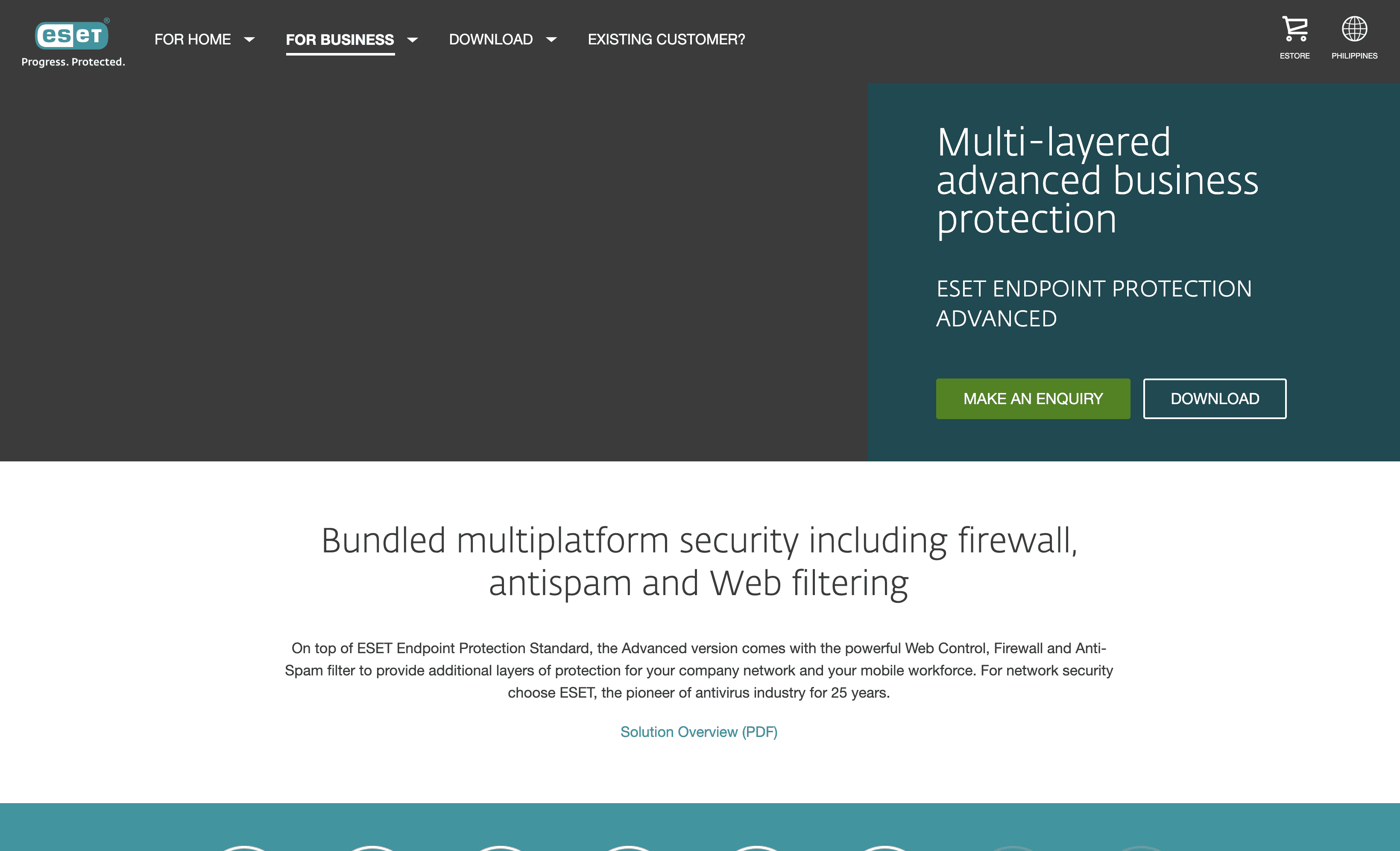
ESET Endpoint Protection Advanced is a multi-layered security solution designed for businesses. It offers comprehensive protection with features like antivirus, mobile security, and remote management. Easy to deploy and manage, it ensures robust defense against cyber threats for various devices and platforms.
Eset Endpoint Protection Advanced Pricing
Eset Endpoint Protection Advanced's pricing is not public. Contact their support for more info.
Eset Endpoint Protection Advanced Reviews
Eset Endpoint Protection Advanced has an overall rating of 4.6 out of 5 stars based on 814 reviews. Users appreciate its high security and ease of use. Check out more of our reviews here!
Pros and Cons of Eset Endpoint Protection Advanced
Pros:
Multi-layered Security: Offers comprehensive protection with antivirus, firewall, and web filtering, ensuring robust defense against various cyber threats.
Remote Management: Centralized management for endpoints, including virtual machines and smartphones, simplifies administration and enhances control.
High Detection Rates: Proven protection with high detection rates and a small footprint, ensuring minimal impact on system performance.
Cons:
Complexity: Multi-layered security solutions can be complex to configure and manage, requiring dedicated IT resources.
Resource Usage: Some users might find the software resource-intensive, potentially slowing down devices.
Cost: Advanced security solutions can be expensive, which might be a barrier for smaller businesses.
5. Avast Endpoint Protection
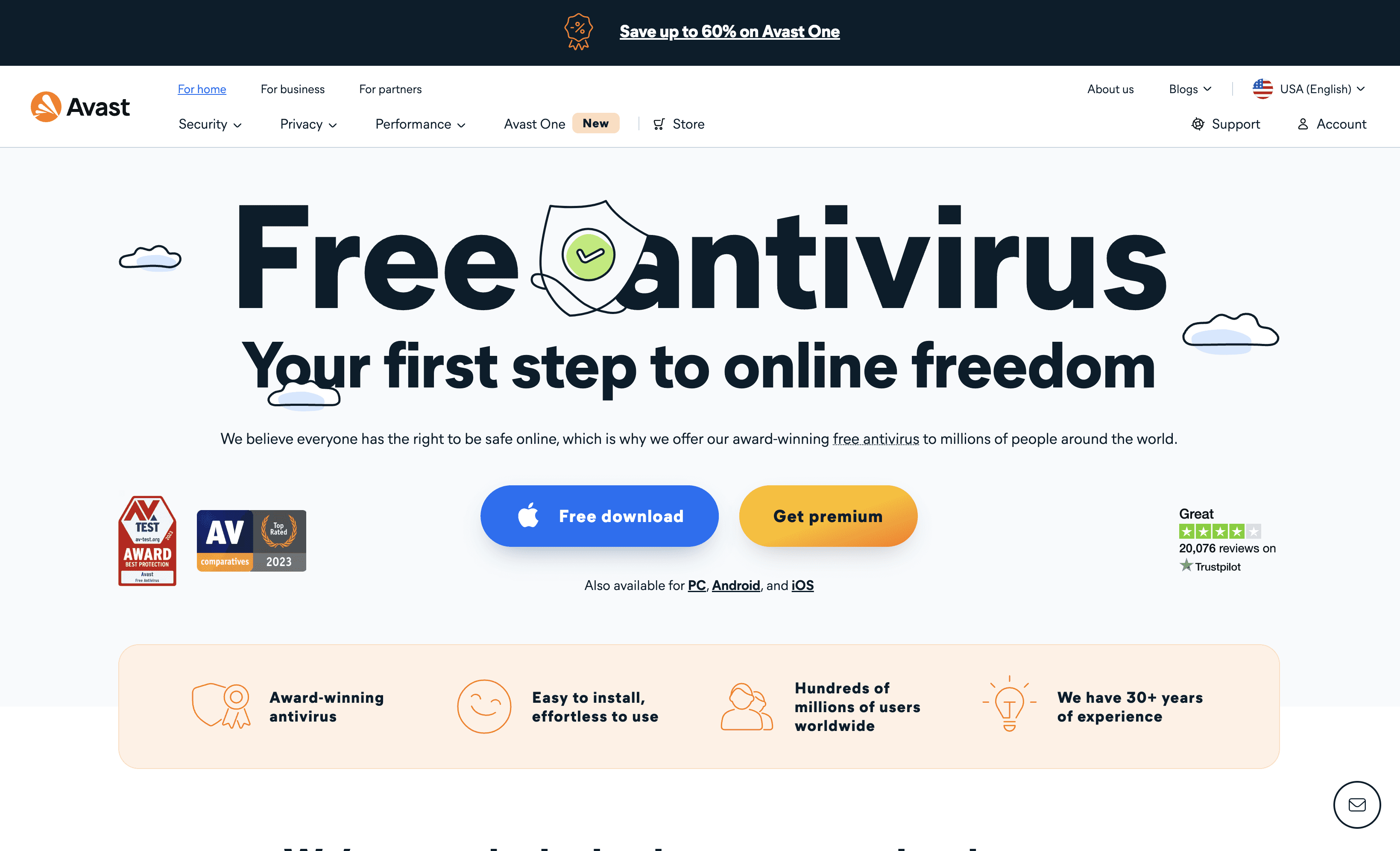
Avast Endpoint Protection is a security solution designed to safeguard businesses from cyber threats. It offers comprehensive protection with features like antivirus, ransomware shield, and firewall. Easy to deploy and manage, Avast aims to provide robust security for businesses of all sizes, ensuring data safety and operational continuity.
Avast Endpoint Protection Pricing
Avast Essential Business Security: $148.36 per year
Avast Premium Business Security: $187.00 per year
Avast Ultimate Business Security: $227.08 per year
Avast Endpoint Protection Reviews
Avast Endpoint Protection has an overall rating of 4.4 out of 5 stars based on 101 reviews. Users appreciate its rich security features and user-friendly controls. Check out more of our reviews here!
Pros and Cons of Avast Endpoint Protection
Pros:
Ease of Use: Simple installation and user-friendly interface make it accessible for users of all technical levels.
Comprehensive Protection: Offers robust defense against viruses, ransomware, phishing, and hackers, ensuring data safety.
Wide User Base: Trusted by millions globally, indicating reliability and effectiveness in cybersecurity.
Cons:
Resource Usage: Can be resource-intensive, potentially slowing down system performance during scans.
Complex Installation: Some users report difficulties during the installation process, requiring technical support.
Subscription Costs: Advanced features and comprehensive protection require a paid subscription, which might be costly for some users.
6. SentinelOne
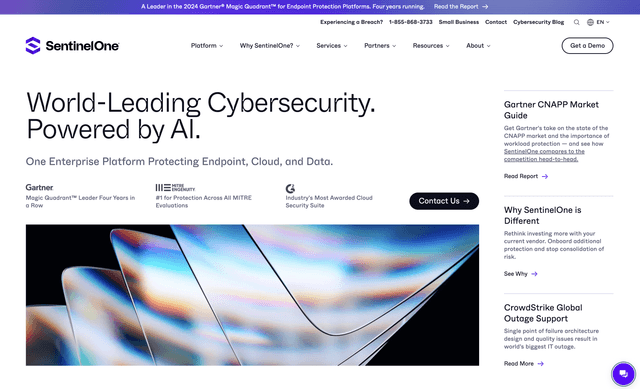
SentinelOne is a cybersecurity platform that uses artificial intelligence to protect enterprise endpoints, cloud environments, and data. It integrates prevention, detection, and response capabilities into a single solution, aiming to reduce risk and enhance efficiency for businesses of all sizes.
SentinelOne Pricing
Singularity Core: $69.99 per endpoint
Singularity Control: $79.99 per endpoint
Singularity Complete: $159.99 per endpoint
Singularity Commercial: $209.99 per endpoint
Singularity Enterprise: Call for Pricing
SentinelOne Reviews
SentinelOne has an overall rating of 4.7 out of 5 stars based on 179 reviews. Users praise its excellent visibility and fast response time. Check out more of our reviews here!
Pros and Cons of SentinelOne
Pros:
SentinelOne's AI-driven platform offers real-time protection and actionable insights, enhancing security operations' efficiency and effectiveness.
Unified protection for endpoints, cloud environments, and identities reduces the need for multiple security solutions, streamlining management.
Recognized as a leader in the Gartner Magic Quadrant for Endpoint Protection Platforms, ensuring top-tier performance and reliability.
Cons:
Smaller businesses might find the platform's comprehensive features complex and more than what they need.
Advanced AI-powered solutions and comprehensive protection might come at a higher cost, impacting budget-conscious organizations.
Heavy reliance on AI could raise concerns about handling false positives or negatives, necessitating human oversight.
7. Webroot Business Endpoint Protection

Webroot Business Endpoint Protection is a cybersecurity solution designed to protect businesses from various cyber threats. It offers multi-vector protection, remote management, and cloud-based architecture, ensuring efficient and comprehensive security. Easy to deploy and manage, Webroot aims to provide robust defense for businesses of all sizes.
Webroot Business Endpoint Protection Pricing
Webroot Business Endpoint Protection's pricing is not public. Contact their support for more info.
Webroot Business Endpoint Protection Reviews
Webroot Business Endpoint Protection has an overall rating of 4.6 out of 5 stars based on 524 reviews. Users appreciate its ease of use and integration. Check out more of our reviews here!
Pros and Cons of Webroot Business Endpoint Protection
Pros:
Multi-vector protection: Safeguards against malicious files, scripts, exploits, and URLs, ensuring comprehensive security.
Remote policy management: Allows administrators to define and manage security policies remotely, enhancing control.
Cloud-based architecture: Continuously analyzes data from over 95 million sensors, providing real-time threat intelligence.
Cons:
Complexity for non-technical users: Advanced features and settings might be overwhelming for those without technical expertise.
Dependence on cloud infrastructure: Requires reliable internet connectivity, which may be a challenge for some organizations.
Partial support for Microsoft Edge: Limited compatibility with certain browsers could affect user experience.
8. WatchGuard Endpoint Security
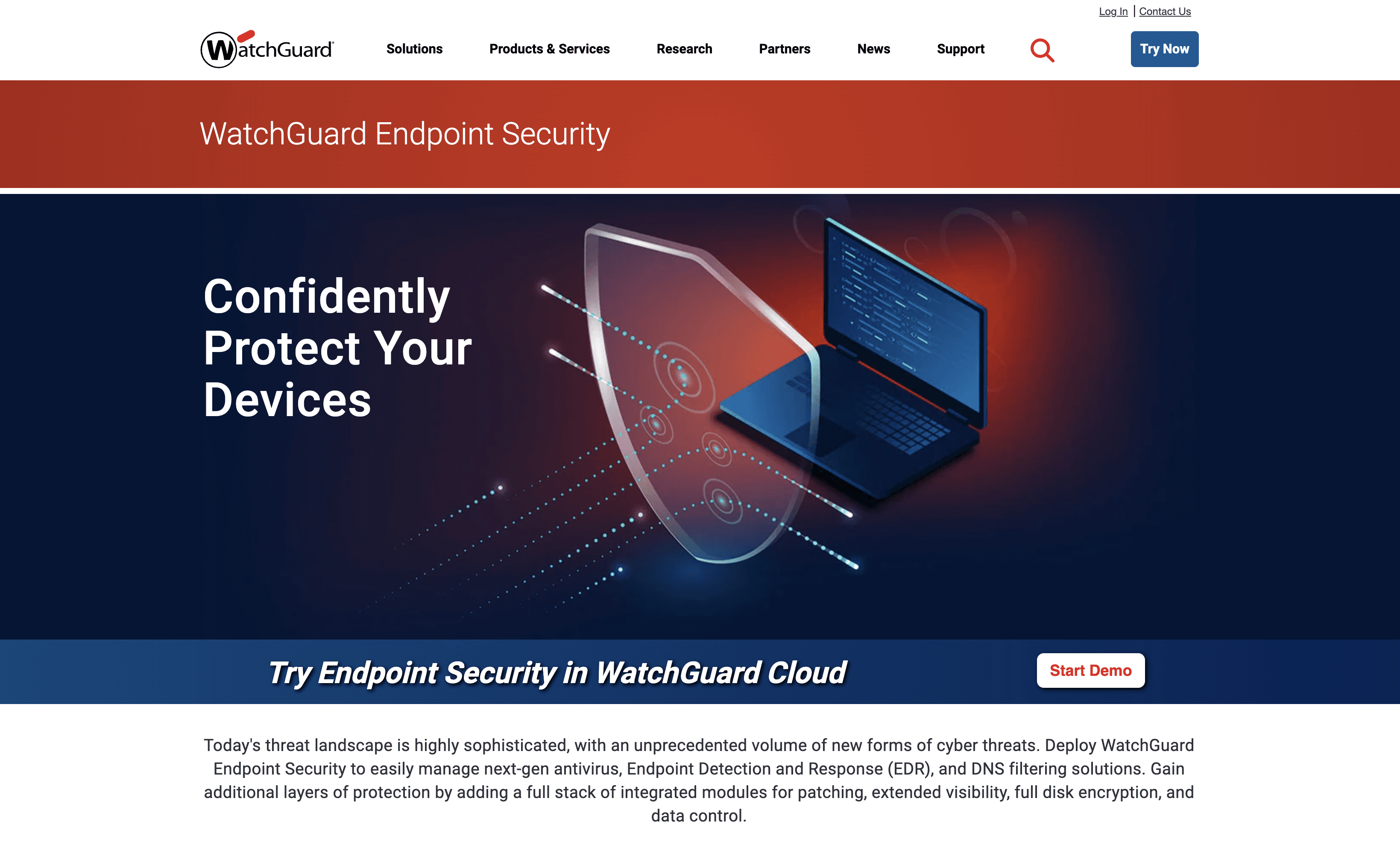
WatchGuard Endpoint Security is a comprehensive cybersecurity solution designed to protect against advanced threats. It integrates next-gen antivirus, Endpoint Detection and Response (EDR), DNS filtering, and additional security modules into WatchGuard's Unified Security Platform. This ensures centralized management, operational automation, and enhanced visibility through WatchGuard Cloud.
WatchGuard Endpoint Security Pricing
WatchGuard Endpoint Security's pricing is not public. Contact their support for more info.
WatchGuard Endpoint Security Reviews
WatchGuard Endpoint Security has an overall rating of 4.4 out of 5 stars based on 115 reviews. Users appreciate its comprehensive protection and ease of use. Check out more of our reviews here!
Pros and Cons of WatchGuard Endpoint Security
Pros:
Comprehensive Protection: Integrates next-gen antivirus, EDR, and DNS filtering for robust defense against advanced threats.
Unified Security Platform: Centralized management and operational automation enhance visibility and streamline security operations.
Scalability: Easily extends security with additional modules for patch management, encryption, and data control.
Cons:
Complexity: The comprehensive nature of the platform may require a steep learning curve for new users.
Dependency on Cloud: Reliance on cloud-based management might be a limitation for organizations with strict data residency requirements.
Potential Cost: The full stack of integrated modules and advanced features might be cost-prohibitive for smaller organizations.
9. Microsoft Defender for Endpoint
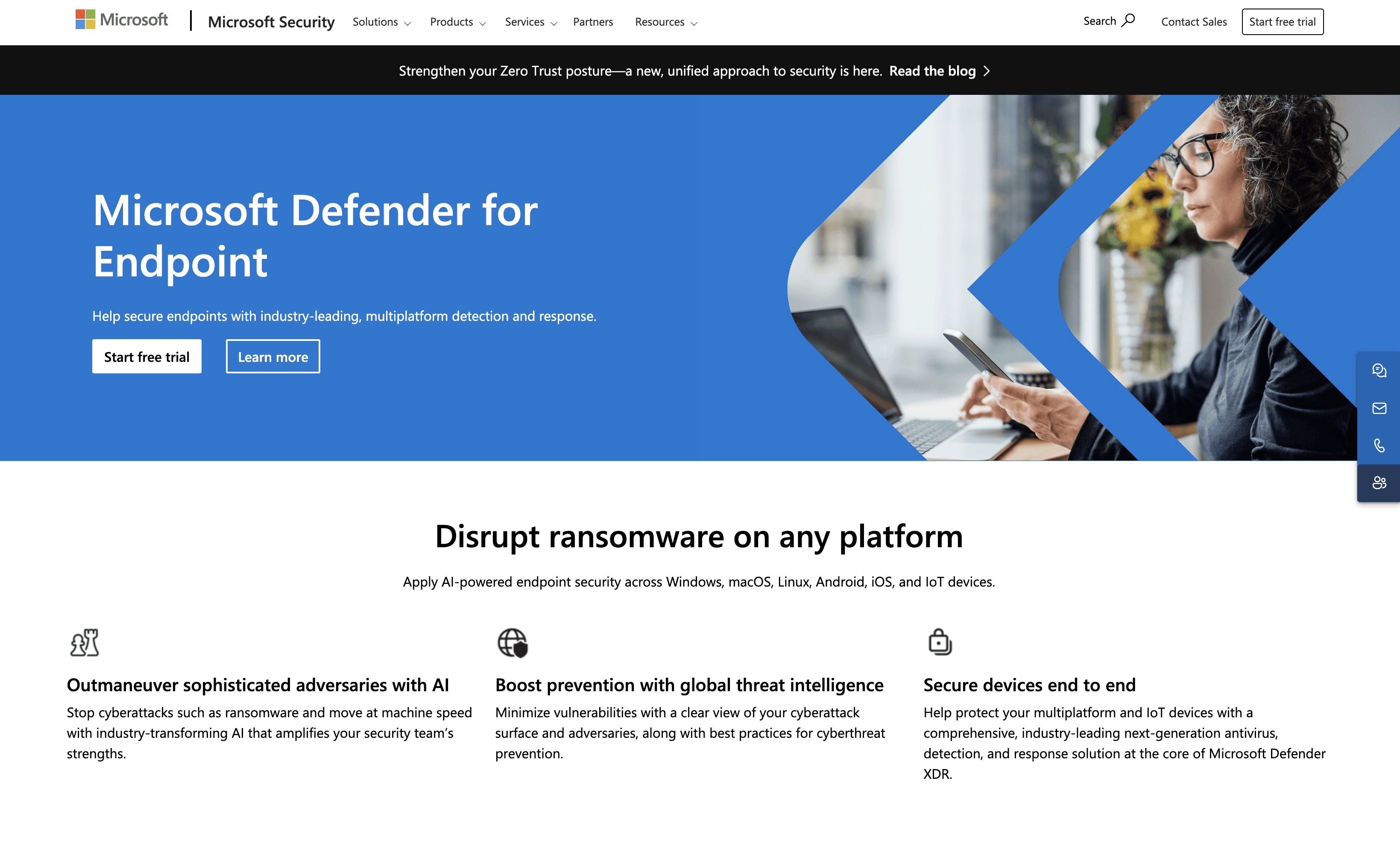
Microsoft Defender for Endpoint is a security solution designed to protect endpoints across various platforms. It offers AI-powered threat detection, global threat intelligence, and automatic attack disruption. With seamless integration into the Microsoft ecosystem, it aims to provide comprehensive and efficient security for businesses of all sizes.
Microsoft Defender for Endpoint Pricing
Microsoft Defender for Endpoint P1: Included with Microsoft 365 E3
Microsoft Defender for Endpoint P2: Included with Microsoft 365 E5
Microsoft Defender for Endpoint Reviews
Microsoft Defender for Endpoint has an overall rating of 4.4 out of 5 stars based on 303 reviews. Users appreciate its comprehensive protection and seamless integration. Check out more of our reviews here!
Pros and Cons of Microsoft Defender for Endpoint
Pros:
AI-Powered Security: Utilizes artificial intelligence to detect and mitigate sophisticated cyber threats, enhancing overall security posture.
Global Threat Intelligence: Leverages extensive threat data to provide real-time insights and proactive defense strategies.
Comprehensive Protection: Offers robust security across multiple platforms, including Windows, macOS, Linux, Android, iOS, and IoT devices.
Cons:
Complexity: Advanced features and settings may require a steep learning curve for new users or those without technical expertise.
Compatibility Issues: Some users report problems with integration across different systems and platforms.
False Positives: Occasional inaccurate threat detection can lead to unnecessary alerts, requiring manual intervention.
10. Hexnode UEM
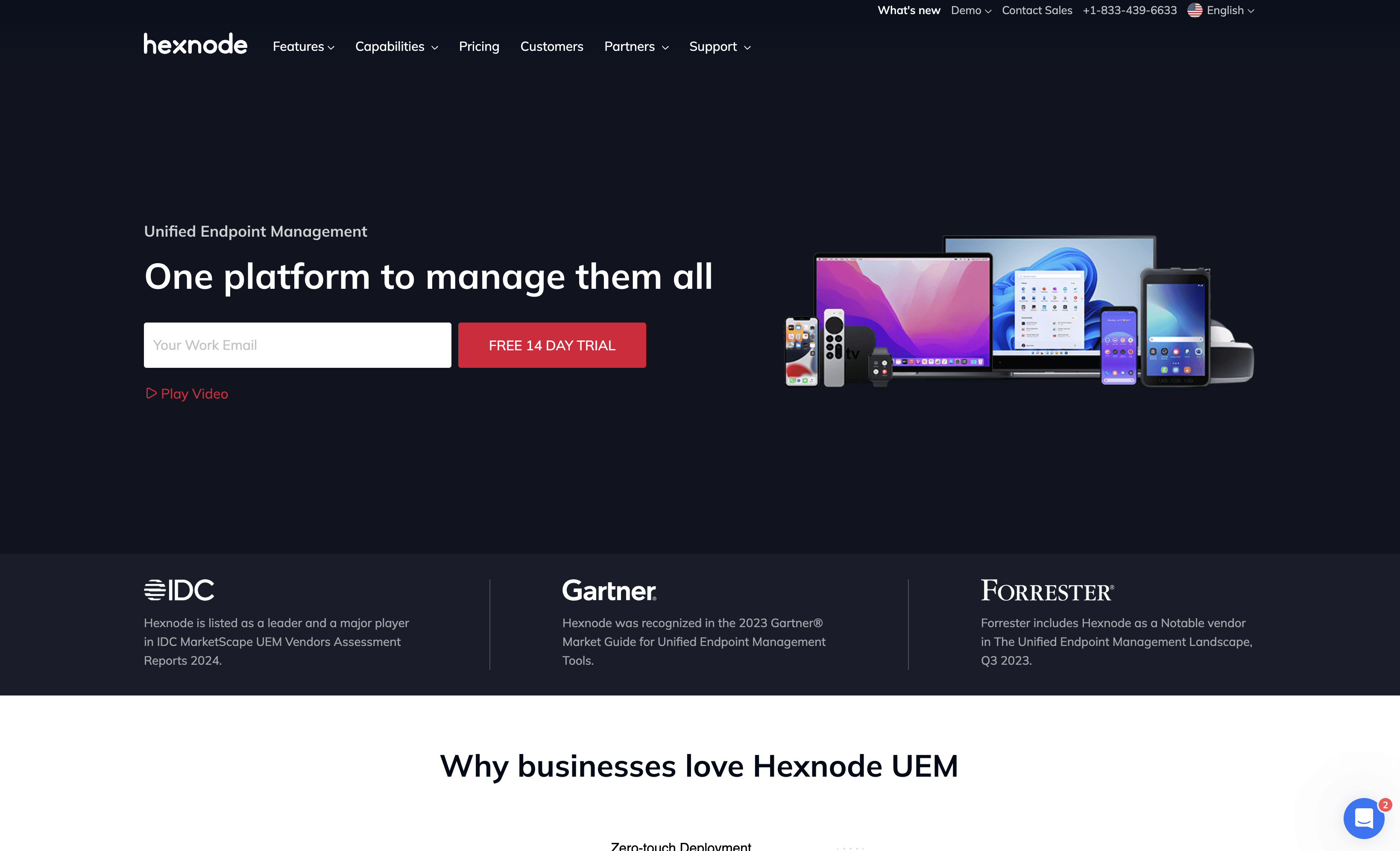
Hexnode UEM is a unified endpoint management solution designed to simplify device management across various platforms. It offers features like security management, app management, and remote control, ensuring comprehensive protection and ease of use. Hexnode aims to provide efficient and scalable solutions for businesses of all sizes.
Hexnode UEM Pricing
Hexnode UEM Express: $1.00 per device/month
Hexnode UEM Pro: $1.80 per device/month
Hexnode UEM Enterprise: $2.70 per device/month
Hexnode UEM Ultimate: $3.60 per device/month
Hexnode UEM Reviews
Hexnode UEM has an overall rating of 4.6 out of 5 stars based on 189 reviews. Users appreciate its ease of use and comprehensive features. Check out more of our reviews here!
Pros and Cons of Hexnode UEM
Pros:
Comprehensive Device Management: Supports a wide range of devices and platforms, ensuring seamless integration and control.
Security Features: Offers enterprise-grade security policies, BitLocker management, and password rules for robust protection.
Ease of Use: User-friendly interface and intuitive design make it accessible for users of all technical levels.
Cons:
Complexity: Managing diverse devices and platforms can be intricate, requiring significant IT expertise.
Cost: Advanced features and comprehensive protection might be expensive for smaller businesses.
Learning Curve: New users may face challenges in fully utilizing all features and capabilities.
Looking to secure your technical infrastructure?
Twingate offers granular access controls and deployment automations to protect your VPC environment. By leveraging Zero Trust security tools, Twingate ensures that private resources and internet traffic remain secure, enabling companies to innovate faster and stay protected. Try Twingate for Free today!
Rapidly implement a modern Zero Trust network that is more secure and maintainable than VPNs.
The Best 10 Alternatives to Symantec (+ Pricing & Reviews)
Twingate Team
•
Jul 27, 2024

Symantec Enterprise Cloud offers comprehensive cybersecurity solutions for large enterprises, focusing on data-centric hybrid security. Their services include consistent compliance, secure remote work, and data and threat protection. However, Symantec might not be the choice for everyone. This article explores the benefits and limitations of Symantec's offerings.

10 Alternatives to Symantec
1. Threatlocker

ThreatLocker is a cybersecurity solution designed to provide enterprise-level protection through Zero Trust endpoint security. It offers features like allowlisting, network control, and storage control, aiming to block untrusted software and prevent cyber threats. ThreatLocker focuses on ease of use and robust security for businesses of all sizes.
Threatlocker Pricing
Threatlocker's pricing is not public. Contact their support for more info.
Threatlocker Reviews
ThreatLocker has an overall rating of 4.8 out of 5 stars based on 162 reviews. Users praise its excellent product quality and unmatched support. Check out more of our reviews here!
Pros and Cons of Threatlocker
Pros:
ThreatLocker provides a robust Zero Trust security model, allowing only necessary software to run and blocking everything else, including ransomware.
The platform includes various tools such as Allowlisting, Ringfencing™, Network Control, and Storage Control, offering a wide range of security features.
The Cyber Hero Team provides 24/7/365 support, ensuring quick response times and expert assistance.
Cons:
The comprehensive nature of the platform might be overwhelming for smaller organizations or those without dedicated IT security teams.
Transitioning to a Zero Trust model and setting up all the features might require significant time and effort.
The advanced features and 24/7 support might come at a higher cost, which could be a barrier for smaller businesses.
2. Cisco Secure Endpoint

Cisco Secure Endpoint is a cloud-native solution designed to provide advanced endpoint security. It focuses on quick detection, response, and recovery from attacks, aiming to reduce remediation times significantly. With features like threat hunting and integrated risk management, it offers a comprehensive security approach for businesses.
Cisco Secure Endpoint Pricing
Cisco Secure Endpoint's pricing is not public. Contact their support for more info.
Cisco Secure Endpoint Reviews
Cisco Secure Endpoint has an overall rating of 4.5 out of 5 stars based on 21 reviews. Users praise its ease of use and comprehensive protection. Check out more of our reviews here!
Pros and Cons ofCisco Secure Endpoint
Pros:
Powerful EDR Capabilities: Advanced endpoint detection and response, threat hunting, and risk-based vulnerability management.
Streamlined Investigations: Orbital Advanced Search provides quick answers about endpoints, simplifying investigations.
Integrated XDR Capabilities: Unified view and automated playbooks with SecureX platform for simplified incident management.
Cons:
Compatibility Issues: Some users report problems with compatibility across different systems.
False Positives: Occasional inaccurate threat detection can lead to unnecessary alerts.
Usability Concerns: Certain areas of the platform are not user-friendly, affecting overall experience.
3. Kaspersky Endpoint Security Cloud

Kaspersky Endpoint Security Cloud is a cybersecurity solution tailored for small to medium-sized businesses. It offers comprehensive protection against malware, ransomware, and other cyber threats. With easy installation and management through a web browser, it ensures robust security while being user-friendly and efficient.
Kaspersky Endpoint Security Cloud Pricing
Kaspersky Endpoint Security Cloud's pricing is not public. Contact their support for more info.
Kaspersky Endpoint Security Cloud Reviews
Kaspersky Endpoint Security Cloud has an overall rating of 4.3 out of 5 stars based on 217 reviews. Users appreciate its single console management and effective protection against various cyber threats. Check out more of our reviews here!
Pros and Cons of Kaspersky Endpoint Security Cloud
Pros:
Comprehensive Protection: Offers robust defense against malware, ransomware, and other cyber threats, ensuring business continuity.
Ease of Use: User-friendly cloud management console simplifies security administration, even for non-experts.
Cost-Effective: Affordable solution with no need for additional hardware, making it ideal for small to medium-sized businesses.
Cons:
High Resource Usage: Some users report that the software can be resource-intensive, potentially slowing down devices.
Compatibility Issues: Occasional problems with compatibility across different systems can disrupt operations.
Complex Console Management: The management console may be challenging for users unfamiliar with cybersecurity solutions.
4. Eset Endpoint Protection Advanced

ESET Endpoint Protection Advanced is a multi-layered security solution designed for businesses. It offers comprehensive protection with features like antivirus, mobile security, and remote management. Easy to deploy and manage, it ensures robust defense against cyber threats for various devices and platforms.
Eset Endpoint Protection Advanced Pricing
Eset Endpoint Protection Advanced's pricing is not public. Contact their support for more info.
Eset Endpoint Protection Advanced Reviews
Eset Endpoint Protection Advanced has an overall rating of 4.6 out of 5 stars based on 814 reviews. Users appreciate its high security and ease of use. Check out more of our reviews here!
Pros and Cons of Eset Endpoint Protection Advanced
Pros:
Multi-layered Security: Offers comprehensive protection with antivirus, firewall, and web filtering, ensuring robust defense against various cyber threats.
Remote Management: Centralized management for endpoints, including virtual machines and smartphones, simplifies administration and enhances control.
High Detection Rates: Proven protection with high detection rates and a small footprint, ensuring minimal impact on system performance.
Cons:
Complexity: Multi-layered security solutions can be complex to configure and manage, requiring dedicated IT resources.
Resource Usage: Some users might find the software resource-intensive, potentially slowing down devices.
Cost: Advanced security solutions can be expensive, which might be a barrier for smaller businesses.
5. Avast Endpoint Protection

Avast Endpoint Protection is a security solution designed to safeguard businesses from cyber threats. It offers comprehensive protection with features like antivirus, ransomware shield, and firewall. Easy to deploy and manage, Avast aims to provide robust security for businesses of all sizes, ensuring data safety and operational continuity.
Avast Endpoint Protection Pricing
Avast Essential Business Security: $148.36 per year
Avast Premium Business Security: $187.00 per year
Avast Ultimate Business Security: $227.08 per year
Avast Endpoint Protection Reviews
Avast Endpoint Protection has an overall rating of 4.4 out of 5 stars based on 101 reviews. Users appreciate its rich security features and user-friendly controls. Check out more of our reviews here!
Pros and Cons of Avast Endpoint Protection
Pros:
Ease of Use: Simple installation and user-friendly interface make it accessible for users of all technical levels.
Comprehensive Protection: Offers robust defense against viruses, ransomware, phishing, and hackers, ensuring data safety.
Wide User Base: Trusted by millions globally, indicating reliability and effectiveness in cybersecurity.
Cons:
Resource Usage: Can be resource-intensive, potentially slowing down system performance during scans.
Complex Installation: Some users report difficulties during the installation process, requiring technical support.
Subscription Costs: Advanced features and comprehensive protection require a paid subscription, which might be costly for some users.
6. SentinelOne

SentinelOne is a cybersecurity platform that uses artificial intelligence to protect enterprise endpoints, cloud environments, and data. It integrates prevention, detection, and response capabilities into a single solution, aiming to reduce risk and enhance efficiency for businesses of all sizes.
SentinelOne Pricing
Singularity Core: $69.99 per endpoint
Singularity Control: $79.99 per endpoint
Singularity Complete: $159.99 per endpoint
Singularity Commercial: $209.99 per endpoint
Singularity Enterprise: Call for Pricing
SentinelOne Reviews
SentinelOne has an overall rating of 4.7 out of 5 stars based on 179 reviews. Users praise its excellent visibility and fast response time. Check out more of our reviews here!
Pros and Cons of SentinelOne
Pros:
SentinelOne's AI-driven platform offers real-time protection and actionable insights, enhancing security operations' efficiency and effectiveness.
Unified protection for endpoints, cloud environments, and identities reduces the need for multiple security solutions, streamlining management.
Recognized as a leader in the Gartner Magic Quadrant for Endpoint Protection Platforms, ensuring top-tier performance and reliability.
Cons:
Smaller businesses might find the platform's comprehensive features complex and more than what they need.
Advanced AI-powered solutions and comprehensive protection might come at a higher cost, impacting budget-conscious organizations.
Heavy reliance on AI could raise concerns about handling false positives or negatives, necessitating human oversight.
7. Webroot Business Endpoint Protection

Webroot Business Endpoint Protection is a cybersecurity solution designed to protect businesses from various cyber threats. It offers multi-vector protection, remote management, and cloud-based architecture, ensuring efficient and comprehensive security. Easy to deploy and manage, Webroot aims to provide robust defense for businesses of all sizes.
Webroot Business Endpoint Protection Pricing
Webroot Business Endpoint Protection's pricing is not public. Contact their support for more info.
Webroot Business Endpoint Protection Reviews
Webroot Business Endpoint Protection has an overall rating of 4.6 out of 5 stars based on 524 reviews. Users appreciate its ease of use and integration. Check out more of our reviews here!
Pros and Cons of Webroot Business Endpoint Protection
Pros:
Multi-vector protection: Safeguards against malicious files, scripts, exploits, and URLs, ensuring comprehensive security.
Remote policy management: Allows administrators to define and manage security policies remotely, enhancing control.
Cloud-based architecture: Continuously analyzes data from over 95 million sensors, providing real-time threat intelligence.
Cons:
Complexity for non-technical users: Advanced features and settings might be overwhelming for those without technical expertise.
Dependence on cloud infrastructure: Requires reliable internet connectivity, which may be a challenge for some organizations.
Partial support for Microsoft Edge: Limited compatibility with certain browsers could affect user experience.
8. WatchGuard Endpoint Security

WatchGuard Endpoint Security is a comprehensive cybersecurity solution designed to protect against advanced threats. It integrates next-gen antivirus, Endpoint Detection and Response (EDR), DNS filtering, and additional security modules into WatchGuard's Unified Security Platform. This ensures centralized management, operational automation, and enhanced visibility through WatchGuard Cloud.
WatchGuard Endpoint Security Pricing
WatchGuard Endpoint Security's pricing is not public. Contact their support for more info.
WatchGuard Endpoint Security Reviews
WatchGuard Endpoint Security has an overall rating of 4.4 out of 5 stars based on 115 reviews. Users appreciate its comprehensive protection and ease of use. Check out more of our reviews here!
Pros and Cons of WatchGuard Endpoint Security
Pros:
Comprehensive Protection: Integrates next-gen antivirus, EDR, and DNS filtering for robust defense against advanced threats.
Unified Security Platform: Centralized management and operational automation enhance visibility and streamline security operations.
Scalability: Easily extends security with additional modules for patch management, encryption, and data control.
Cons:
Complexity: The comprehensive nature of the platform may require a steep learning curve for new users.
Dependency on Cloud: Reliance on cloud-based management might be a limitation for organizations with strict data residency requirements.
Potential Cost: The full stack of integrated modules and advanced features might be cost-prohibitive for smaller organizations.
9. Microsoft Defender for Endpoint

Microsoft Defender for Endpoint is a security solution designed to protect endpoints across various platforms. It offers AI-powered threat detection, global threat intelligence, and automatic attack disruption. With seamless integration into the Microsoft ecosystem, it aims to provide comprehensive and efficient security for businesses of all sizes.
Microsoft Defender for Endpoint Pricing
Microsoft Defender for Endpoint P1: Included with Microsoft 365 E3
Microsoft Defender for Endpoint P2: Included with Microsoft 365 E5
Microsoft Defender for Endpoint Reviews
Microsoft Defender for Endpoint has an overall rating of 4.4 out of 5 stars based on 303 reviews. Users appreciate its comprehensive protection and seamless integration. Check out more of our reviews here!
Pros and Cons of Microsoft Defender for Endpoint
Pros:
AI-Powered Security: Utilizes artificial intelligence to detect and mitigate sophisticated cyber threats, enhancing overall security posture.
Global Threat Intelligence: Leverages extensive threat data to provide real-time insights and proactive defense strategies.
Comprehensive Protection: Offers robust security across multiple platforms, including Windows, macOS, Linux, Android, iOS, and IoT devices.
Cons:
Complexity: Advanced features and settings may require a steep learning curve for new users or those without technical expertise.
Compatibility Issues: Some users report problems with integration across different systems and platforms.
False Positives: Occasional inaccurate threat detection can lead to unnecessary alerts, requiring manual intervention.
10. Hexnode UEM

Hexnode UEM is a unified endpoint management solution designed to simplify device management across various platforms. It offers features like security management, app management, and remote control, ensuring comprehensive protection and ease of use. Hexnode aims to provide efficient and scalable solutions for businesses of all sizes.
Hexnode UEM Pricing
Hexnode UEM Express: $1.00 per device/month
Hexnode UEM Pro: $1.80 per device/month
Hexnode UEM Enterprise: $2.70 per device/month
Hexnode UEM Ultimate: $3.60 per device/month
Hexnode UEM Reviews
Hexnode UEM has an overall rating of 4.6 out of 5 stars based on 189 reviews. Users appreciate its ease of use and comprehensive features. Check out more of our reviews here!
Pros and Cons of Hexnode UEM
Pros:
Comprehensive Device Management: Supports a wide range of devices and platforms, ensuring seamless integration and control.
Security Features: Offers enterprise-grade security policies, BitLocker management, and password rules for robust protection.
Ease of Use: User-friendly interface and intuitive design make it accessible for users of all technical levels.
Cons:
Complexity: Managing diverse devices and platforms can be intricate, requiring significant IT expertise.
Cost: Advanced features and comprehensive protection might be expensive for smaller businesses.
Learning Curve: New users may face challenges in fully utilizing all features and capabilities.
Looking to secure your technical infrastructure?
Twingate offers granular access controls and deployment automations to protect your VPC environment. By leveraging Zero Trust security tools, Twingate ensures that private resources and internet traffic remain secure, enabling companies to innovate faster and stay protected. Try Twingate for Free today!
Rapidly implement a modern Zero Trust network that is more secure and maintainable than VPNs.
The Best 10 Alternatives to Symantec (+ Pricing & Reviews)
Twingate Team
•
Jul 27, 2024

Symantec Enterprise Cloud offers comprehensive cybersecurity solutions for large enterprises, focusing on data-centric hybrid security. Their services include consistent compliance, secure remote work, and data and threat protection. However, Symantec might not be the choice for everyone. This article explores the benefits and limitations of Symantec's offerings.

10 Alternatives to Symantec
1. Threatlocker

ThreatLocker is a cybersecurity solution designed to provide enterprise-level protection through Zero Trust endpoint security. It offers features like allowlisting, network control, and storage control, aiming to block untrusted software and prevent cyber threats. ThreatLocker focuses on ease of use and robust security for businesses of all sizes.
Threatlocker Pricing
Threatlocker's pricing is not public. Contact their support for more info.
Threatlocker Reviews
ThreatLocker has an overall rating of 4.8 out of 5 stars based on 162 reviews. Users praise its excellent product quality and unmatched support. Check out more of our reviews here!
Pros and Cons of Threatlocker
Pros:
ThreatLocker provides a robust Zero Trust security model, allowing only necessary software to run and blocking everything else, including ransomware.
The platform includes various tools such as Allowlisting, Ringfencing™, Network Control, and Storage Control, offering a wide range of security features.
The Cyber Hero Team provides 24/7/365 support, ensuring quick response times and expert assistance.
Cons:
The comprehensive nature of the platform might be overwhelming for smaller organizations or those without dedicated IT security teams.
Transitioning to a Zero Trust model and setting up all the features might require significant time and effort.
The advanced features and 24/7 support might come at a higher cost, which could be a barrier for smaller businesses.
2. Cisco Secure Endpoint

Cisco Secure Endpoint is a cloud-native solution designed to provide advanced endpoint security. It focuses on quick detection, response, and recovery from attacks, aiming to reduce remediation times significantly. With features like threat hunting and integrated risk management, it offers a comprehensive security approach for businesses.
Cisco Secure Endpoint Pricing
Cisco Secure Endpoint's pricing is not public. Contact their support for more info.
Cisco Secure Endpoint Reviews
Cisco Secure Endpoint has an overall rating of 4.5 out of 5 stars based on 21 reviews. Users praise its ease of use and comprehensive protection. Check out more of our reviews here!
Pros and Cons ofCisco Secure Endpoint
Pros:
Powerful EDR Capabilities: Advanced endpoint detection and response, threat hunting, and risk-based vulnerability management.
Streamlined Investigations: Orbital Advanced Search provides quick answers about endpoints, simplifying investigations.
Integrated XDR Capabilities: Unified view and automated playbooks with SecureX platform for simplified incident management.
Cons:
Compatibility Issues: Some users report problems with compatibility across different systems.
False Positives: Occasional inaccurate threat detection can lead to unnecessary alerts.
Usability Concerns: Certain areas of the platform are not user-friendly, affecting overall experience.
3. Kaspersky Endpoint Security Cloud

Kaspersky Endpoint Security Cloud is a cybersecurity solution tailored for small to medium-sized businesses. It offers comprehensive protection against malware, ransomware, and other cyber threats. With easy installation and management through a web browser, it ensures robust security while being user-friendly and efficient.
Kaspersky Endpoint Security Cloud Pricing
Kaspersky Endpoint Security Cloud's pricing is not public. Contact their support for more info.
Kaspersky Endpoint Security Cloud Reviews
Kaspersky Endpoint Security Cloud has an overall rating of 4.3 out of 5 stars based on 217 reviews. Users appreciate its single console management and effective protection against various cyber threats. Check out more of our reviews here!
Pros and Cons of Kaspersky Endpoint Security Cloud
Pros:
Comprehensive Protection: Offers robust defense against malware, ransomware, and other cyber threats, ensuring business continuity.
Ease of Use: User-friendly cloud management console simplifies security administration, even for non-experts.
Cost-Effective: Affordable solution with no need for additional hardware, making it ideal for small to medium-sized businesses.
Cons:
High Resource Usage: Some users report that the software can be resource-intensive, potentially slowing down devices.
Compatibility Issues: Occasional problems with compatibility across different systems can disrupt operations.
Complex Console Management: The management console may be challenging for users unfamiliar with cybersecurity solutions.
4. Eset Endpoint Protection Advanced

ESET Endpoint Protection Advanced is a multi-layered security solution designed for businesses. It offers comprehensive protection with features like antivirus, mobile security, and remote management. Easy to deploy and manage, it ensures robust defense against cyber threats for various devices and platforms.
Eset Endpoint Protection Advanced Pricing
Eset Endpoint Protection Advanced's pricing is not public. Contact their support for more info.
Eset Endpoint Protection Advanced Reviews
Eset Endpoint Protection Advanced has an overall rating of 4.6 out of 5 stars based on 814 reviews. Users appreciate its high security and ease of use. Check out more of our reviews here!
Pros and Cons of Eset Endpoint Protection Advanced
Pros:
Multi-layered Security: Offers comprehensive protection with antivirus, firewall, and web filtering, ensuring robust defense against various cyber threats.
Remote Management: Centralized management for endpoints, including virtual machines and smartphones, simplifies administration and enhances control.
High Detection Rates: Proven protection with high detection rates and a small footprint, ensuring minimal impact on system performance.
Cons:
Complexity: Multi-layered security solutions can be complex to configure and manage, requiring dedicated IT resources.
Resource Usage: Some users might find the software resource-intensive, potentially slowing down devices.
Cost: Advanced security solutions can be expensive, which might be a barrier for smaller businesses.
5. Avast Endpoint Protection

Avast Endpoint Protection is a security solution designed to safeguard businesses from cyber threats. It offers comprehensive protection with features like antivirus, ransomware shield, and firewall. Easy to deploy and manage, Avast aims to provide robust security for businesses of all sizes, ensuring data safety and operational continuity.
Avast Endpoint Protection Pricing
Avast Essential Business Security: $148.36 per year
Avast Premium Business Security: $187.00 per year
Avast Ultimate Business Security: $227.08 per year
Avast Endpoint Protection Reviews
Avast Endpoint Protection has an overall rating of 4.4 out of 5 stars based on 101 reviews. Users appreciate its rich security features and user-friendly controls. Check out more of our reviews here!
Pros and Cons of Avast Endpoint Protection
Pros:
Ease of Use: Simple installation and user-friendly interface make it accessible for users of all technical levels.
Comprehensive Protection: Offers robust defense against viruses, ransomware, phishing, and hackers, ensuring data safety.
Wide User Base: Trusted by millions globally, indicating reliability and effectiveness in cybersecurity.
Cons:
Resource Usage: Can be resource-intensive, potentially slowing down system performance during scans.
Complex Installation: Some users report difficulties during the installation process, requiring technical support.
Subscription Costs: Advanced features and comprehensive protection require a paid subscription, which might be costly for some users.
6. SentinelOne

SentinelOne is a cybersecurity platform that uses artificial intelligence to protect enterprise endpoints, cloud environments, and data. It integrates prevention, detection, and response capabilities into a single solution, aiming to reduce risk and enhance efficiency for businesses of all sizes.
SentinelOne Pricing
Singularity Core: $69.99 per endpoint
Singularity Control: $79.99 per endpoint
Singularity Complete: $159.99 per endpoint
Singularity Commercial: $209.99 per endpoint
Singularity Enterprise: Call for Pricing
SentinelOne Reviews
SentinelOne has an overall rating of 4.7 out of 5 stars based on 179 reviews. Users praise its excellent visibility and fast response time. Check out more of our reviews here!
Pros and Cons of SentinelOne
Pros:
SentinelOne's AI-driven platform offers real-time protection and actionable insights, enhancing security operations' efficiency and effectiveness.
Unified protection for endpoints, cloud environments, and identities reduces the need for multiple security solutions, streamlining management.
Recognized as a leader in the Gartner Magic Quadrant for Endpoint Protection Platforms, ensuring top-tier performance and reliability.
Cons:
Smaller businesses might find the platform's comprehensive features complex and more than what they need.
Advanced AI-powered solutions and comprehensive protection might come at a higher cost, impacting budget-conscious organizations.
Heavy reliance on AI could raise concerns about handling false positives or negatives, necessitating human oversight.
7. Webroot Business Endpoint Protection

Webroot Business Endpoint Protection is a cybersecurity solution designed to protect businesses from various cyber threats. It offers multi-vector protection, remote management, and cloud-based architecture, ensuring efficient and comprehensive security. Easy to deploy and manage, Webroot aims to provide robust defense for businesses of all sizes.
Webroot Business Endpoint Protection Pricing
Webroot Business Endpoint Protection's pricing is not public. Contact their support for more info.
Webroot Business Endpoint Protection Reviews
Webroot Business Endpoint Protection has an overall rating of 4.6 out of 5 stars based on 524 reviews. Users appreciate its ease of use and integration. Check out more of our reviews here!
Pros and Cons of Webroot Business Endpoint Protection
Pros:
Multi-vector protection: Safeguards against malicious files, scripts, exploits, and URLs, ensuring comprehensive security.
Remote policy management: Allows administrators to define and manage security policies remotely, enhancing control.
Cloud-based architecture: Continuously analyzes data from over 95 million sensors, providing real-time threat intelligence.
Cons:
Complexity for non-technical users: Advanced features and settings might be overwhelming for those without technical expertise.
Dependence on cloud infrastructure: Requires reliable internet connectivity, which may be a challenge for some organizations.
Partial support for Microsoft Edge: Limited compatibility with certain browsers could affect user experience.
8. WatchGuard Endpoint Security

WatchGuard Endpoint Security is a comprehensive cybersecurity solution designed to protect against advanced threats. It integrates next-gen antivirus, Endpoint Detection and Response (EDR), DNS filtering, and additional security modules into WatchGuard's Unified Security Platform. This ensures centralized management, operational automation, and enhanced visibility through WatchGuard Cloud.
WatchGuard Endpoint Security Pricing
WatchGuard Endpoint Security's pricing is not public. Contact their support for more info.
WatchGuard Endpoint Security Reviews
WatchGuard Endpoint Security has an overall rating of 4.4 out of 5 stars based on 115 reviews. Users appreciate its comprehensive protection and ease of use. Check out more of our reviews here!
Pros and Cons of WatchGuard Endpoint Security
Pros:
Comprehensive Protection: Integrates next-gen antivirus, EDR, and DNS filtering for robust defense against advanced threats.
Unified Security Platform: Centralized management and operational automation enhance visibility and streamline security operations.
Scalability: Easily extends security with additional modules for patch management, encryption, and data control.
Cons:
Complexity: The comprehensive nature of the platform may require a steep learning curve for new users.
Dependency on Cloud: Reliance on cloud-based management might be a limitation for organizations with strict data residency requirements.
Potential Cost: The full stack of integrated modules and advanced features might be cost-prohibitive for smaller organizations.
9. Microsoft Defender for Endpoint

Microsoft Defender for Endpoint is a security solution designed to protect endpoints across various platforms. It offers AI-powered threat detection, global threat intelligence, and automatic attack disruption. With seamless integration into the Microsoft ecosystem, it aims to provide comprehensive and efficient security for businesses of all sizes.
Microsoft Defender for Endpoint Pricing
Microsoft Defender for Endpoint P1: Included with Microsoft 365 E3
Microsoft Defender for Endpoint P2: Included with Microsoft 365 E5
Microsoft Defender for Endpoint Reviews
Microsoft Defender for Endpoint has an overall rating of 4.4 out of 5 stars based on 303 reviews. Users appreciate its comprehensive protection and seamless integration. Check out more of our reviews here!
Pros and Cons of Microsoft Defender for Endpoint
Pros:
AI-Powered Security: Utilizes artificial intelligence to detect and mitigate sophisticated cyber threats, enhancing overall security posture.
Global Threat Intelligence: Leverages extensive threat data to provide real-time insights and proactive defense strategies.
Comprehensive Protection: Offers robust security across multiple platforms, including Windows, macOS, Linux, Android, iOS, and IoT devices.
Cons:
Complexity: Advanced features and settings may require a steep learning curve for new users or those without technical expertise.
Compatibility Issues: Some users report problems with integration across different systems and platforms.
False Positives: Occasional inaccurate threat detection can lead to unnecessary alerts, requiring manual intervention.
10. Hexnode UEM

Hexnode UEM is a unified endpoint management solution designed to simplify device management across various platforms. It offers features like security management, app management, and remote control, ensuring comprehensive protection and ease of use. Hexnode aims to provide efficient and scalable solutions for businesses of all sizes.
Hexnode UEM Pricing
Hexnode UEM Express: $1.00 per device/month
Hexnode UEM Pro: $1.80 per device/month
Hexnode UEM Enterprise: $2.70 per device/month
Hexnode UEM Ultimate: $3.60 per device/month
Hexnode UEM Reviews
Hexnode UEM has an overall rating of 4.6 out of 5 stars based on 189 reviews. Users appreciate its ease of use and comprehensive features. Check out more of our reviews here!
Pros and Cons of Hexnode UEM
Pros:
Comprehensive Device Management: Supports a wide range of devices and platforms, ensuring seamless integration and control.
Security Features: Offers enterprise-grade security policies, BitLocker management, and password rules for robust protection.
Ease of Use: User-friendly interface and intuitive design make it accessible for users of all technical levels.
Cons:
Complexity: Managing diverse devices and platforms can be intricate, requiring significant IT expertise.
Cost: Advanced features and comprehensive protection might be expensive for smaller businesses.
Learning Curve: New users may face challenges in fully utilizing all features and capabilities.
Looking to secure your technical infrastructure?
Twingate offers granular access controls and deployment automations to protect your VPC environment. By leveraging Zero Trust security tools, Twingate ensures that private resources and internet traffic remain secure, enabling companies to innovate faster and stay protected. Try Twingate for Free today!
Solutions
Solutions
The VPN replacement your workforce will love.
Solutions